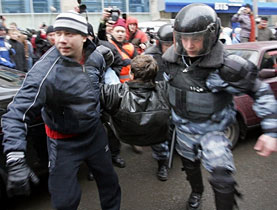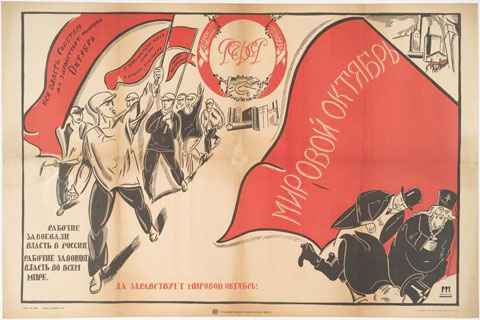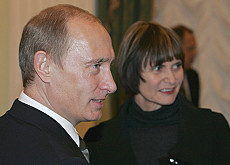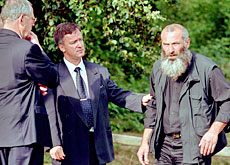Putin’s party set for Russian election win

Sunday's Russian parliamentary elections are looking like a foregone conclusion, with President Vladimir Putin's supporters most likely to win.
Despite widely reported political repression taking place in Moscow and elsewhere, Switzerland has chosen to pursue the development of its relationship with Russia.
“The result is in no doubt,” said Thérèse Obrecht, a former Swiss television correspondent in the Russian capital. “These elections are turning into a plebiscite for Putin.”
Opposition parties have been harassed by police and the president’s supporters. His own party, United Russia, could garner up to two-thirds of the vote and carry off up to 80 per cent of the seats available in the State Duma.
The remaining seats will be split among the parties with at least seven per cent of the vote. But polls show that only the communists are likely to meet that target.
“We aren’t far off a single-party regime,” Obrecht told swissinfo.
The repression that is being wielded against opposition parties and civil society, none of them a real threat to the Kremlin, harkens back to the old Soviet secret services, the KGB – Putin’s one-time employer.
“The government fears an Orange Revolution, along the lines of what happened in Ukraine in 2004,” said Obrecht. “This is why non-governmental organisations are being accused of accepting foreign financial support.”
Election observers
The situation has reached the point where the Organisation for Security and Cooperation in Europe (OSCE) decided not to bother sending observers for the December 2 elections.
“The Russians were going to make it so difficult to work that the observers had to abandon their mission, and that is detrimental to the quality of their work,” said Andreas Gross, a Swiss parliamentarian who regularly oversees elections abroad.
Gross, who is heading for Ekaterinburg in Siberia as an electoral observer for the Council of Europe, says this is only the fifth time in 40 elections over the past decade that he has seen this happen.
Western nations, including Switzerland, have not reacted to the situation. Only the United States and the European Union have made formal protests.
But the Swiss foreign ministry says that human rights were on the agenda when Swiss President Micheline Calmy-Rey recently visited Moscow. Calmy-Rey spent three hours meeting Putin, discussing issues such as Iran’s nuclear ambitions.
Reinforce ties
But if Russia is reaffirming its global status, the Swiss also want to reinforce their ties with Moscow for other reasons.
The Russian economy is growing strongly, boosted by rising oil prices. Russia is the third biggest producer and second biggest exporter of petrol.
“It is a developing economy with an impressive growth rate and which is diversifying, especially for consumer products,” pointed out Daniel Hunn, head of economic affairs at the Swiss embassy in Moscow.
“In Russia, there are 600 companies operating with some kind of Swiss participation.”
However, Obrecht says Russia is no paradise, with 30 per cent of the population living in poverty.
“Russians wanted law and order, yet corruption is everywhere,” she told swissinfo. “Even the richest Russians make sure some of their wealth is abroad as they don’t trust their banking system.”
swissinfo
In 2006, Switzerland sold Russia goods worth SFr2.2 billion ($2 billion), mainly pharmaceutical products, machinery, watches and jewellery.
Russia sold for its part goods worth SFr1.9 billion to the Swiss, mainly raw materials – including one-third of the natural gas used in Switzerland – and chemicals.
There are also SFr12 billion in Russian exports, most of it gold, that do not appear in Swiss statistics.
Officially, the Swiss do not tally gold transactions for individual nations, but only track the global amount. In 2006, 1,500 tons of gold – worth SFr30 billion – entered Switzerland.
Most of this gold is sourced from South Africa and Russia. It is usually sold between banks. Swiss buyers normally refine it and resell, making profits of up to SFr6,000 per kilogram.
In 2006, Swiss investments in Russia were worth $2,047 billion.
Switzerland is the eighth biggest foreign investor.
Swiss companies operating there include Novartis, ABB, Holcim, Barry Callebaut, Liebherr and Schindler.

In compliance with the JTI standards
More: SWI swissinfo.ch certified by the Journalism Trust Initiative



You can find an overview of ongoing debates with our journalists here . Please join us!
If you want to start a conversation about a topic raised in this article or want to report factual errors, email us at english@swissinfo.ch.